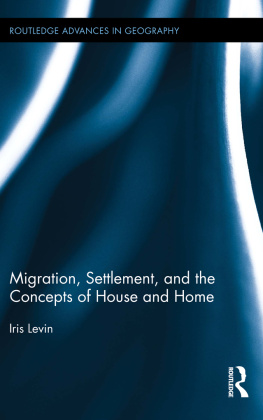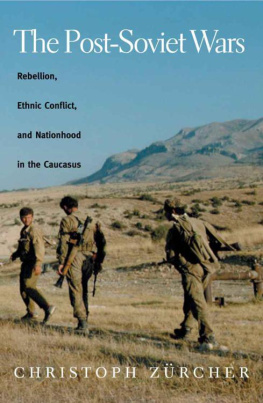
Culture, Ethnicity and Migration After Communism
This book addresses the issue of emerging transnationalism in the conditions of post-socialism through focusing on migrants identity as a social construction resulting from their experience of the transnational circuit of culture as well as from post-Soviet shifts in political and economic conditions in their home regions.
Anton Popov draws upon ethnographic research conducted among Greek transnational migrants living on the Black Sea coast and in the North Caucasus regions of Russia who have become involved in extensive cross-border migration between the former Soviet Union (the Russian Federation, Kazakhstan and Georgia) and Greece (as well as Cyprus). It is estimated that more than 150,000 former Soviet citizens of Greek origin have resettled in Greece since the late 1980s. Yet, many of those who emigrate do not cut their connections with the home communities in Russia but instead establish their own transnational circuit of travel between Greece and Russia.
This study demonstrates how migrants employ their ethnicity as symbolic capital available for investment in transnational migration. Simultaneously they rework their practices of family networking, property relations and political participation in a way which strengthens their attachment to the local territory. The findings presented in the book imply that the social identities, economic strategies, political practices and cultural representation of the Russias Pontic Greeks are all deeply embedded in the shifting social and cultural landscape of post-Soviet Russia and extensively influenced by the global movement of ideas, goods and people.
Anton Popov is Lecturer in Sociology at Aston University, UK. His research interests include sociological and anthropological approaches to globalisation, migration, identity and transnationalism; ethnicity; youth culture; multiculturalism and minority rights.
First published 2016
by Routledge
2 Park Square, Milton Park, Abingdon, Oxon OX14 4RN
and by Routledge
711 Third Avenue, New York, NY 10017
Routledge is an imprint of the Taylor & Francis Group, an informa business
2016 Anton Popov
The right of Anton Popov to be identified as author of this work has been asserted by him in accordance with sections 77 and 78 of the Copyright, Designs and Patents Act 1988.
All rights reserved. No part of this book may be reprinted or reproduced or utilised in any form or by any electronic, mechanical, or other means, now known or hereafter invented, including photocopying and recording, or in any information storage or retrieval system, without permission in writing from the publishers.
Trademark notice : Product or corporate names may be trademarks or registered trademarks, and are used only for identification and explanation without intent to infringe.
British Library Cataloguing in Publication Data
A catalogue record for this book is available from the British Library
Library of Congress Cataloging-in-Publication Data
Names: Popov, Anton.
Title: Culture, ethnicity and migration after communism : the Pontic
Greeks / by Anton Popov.
Description: Farnham, Surrey, England : Ashgate, 2016. | Includes
bibliographical references and index.
Identifiers: LCCN 2015034247 | ISBN 9781472438430
(hardback : alkaline paper)
Subjects: LCSH: GreeksRussia, SouthernSocial conditions. |
GreeksRussia, SouthernEthnic identity. | GreeksRussia,
SouthernMigrations. | TransnationalismSocial aspectsRussia,
Southern. | Post-communismSocial aspectsRussia, Southern. |
HomeSocial aspectsRussia, Southern. | Community lifeRussia,
Southern. | Russia, SouthernEthnic relations. | Russia (Federation)
Ethnic relations.
Classification: LCC DK34.G74 P67 2016 | DDC 305.88dc23
ISBN: 9781472438430 (hbk)
ISBN: 9781315575513 (ebk)
Typeset in Times New Roman
by Apex CoVantage, LLC
To my grandparents Aleksei and Klavdia
Contents
This book would not have been written without the help and support of many people. It is based on the research conducted as part of my PhD project and I would like to express my sincere thanks and appreciation to my supervisors, Hilary Pilkington and Elizabeth Edginton, who were generous with their knowledge and time and provided me with their intellectual guidance and encouragement throughout my doctoral study at the Centre for Russian and East European Studies in the University of Birmingham.
I also benefited a lot from discussions with my colleagues and friends. These numerous conversations were both very informative and inspiring, and ultimately helped to develop my research ideas and to shape the argument of this book. For their advice, suggestions and comments I am grateful in particular to Frances Pine, Kataryna Wolczuk, Moya Flynn, Galina Yemelianova, Kathryn Tomlinson, Anthony Bryer, Igor Kuznetsov, Vladimir Kolesov, Nikolai Ssorin-Chaikov, Lale Yaln-Heckmann, Hlya Demirdirek, Bruce Grant and Georgios Agelopoulos.
The research would not have been possible without my informants willingness to take part in it, to talk to me and to help me. My grateful thanks to all those who have been involved in my study in Vitiazevo, Gaverdovskii, Gelendzhik, Novorossiisk, Maykop, Severskaia and Krasnodar, although not all names can be mentioned here. I am especially grateful to the leadership of the Greek national-cultural organisations in Krasnodar, Vitiazevo and Maykop for their assistance in introducing me to the local communities and help with finding contacts and accommodation in the fieldwork sites. A special word of thanks goes to Ekaterina Georgievna, Ivan Konstantinovich, Kostia and Yura, Semen, Zosim Fotievich, Kateni, Nina, Euthumios Papadopoulos and Lazaros Papadopoulos, Marat Gubzhokov and his family, Konstantin Dmitiriev and his parents-in-law for their friendship, hospitality and kindness. I also would like to remember Ivan Andreevich, who tragically died in 2002.
I would like to thank my wife, Ariadna, for her love and endless patience. Without her help and support the writing of this book would have been incredibly difficult. Our daughters, Dasha, Tasya and Alexia, without realising it, contributed to writing this book by keeping me real, helping to sort out the priorities and bringing eternal joy in my life. I am also thankful to my sister Lidia, my niece Praskovia, my parents-in-law Nadezhda and Alexander for being there ready to help when they were most needed. I am forever indebted to my late grandparents, Aleksei Mikhailovich and Klavdia Georgievna, from whom I learned how to be inquisitive and interested in the world, to work hard, be brave and see opportunities in whatever challenges I face. My most sincere thanks to my parents, Tatiana and Pavel, for everything.
In the book I use some material that partly had been previously published as journal articles or chapters in edited volumes, such as, Popov, A. and Kuznetsov, I. (2008) Ethnic Discrimination and the Discourse of Indigenisation: the Regional Regime, Indigenous Majority and Ethnic Minorities in Krasnodar Krai, Nationalities Papers , Vol. 36, No. 2 (May 2008), pp. 24372 (in ). Therefore, I am grateful to editors and anonymous reviewers who worked with me on these publications and the draft manuscript; their comments and suggestions helped me develop and clarify my arguments. I thank Helena Hamilton for her invaluable help in proofreading the manuscript. All remaining deficiencies in this book are of course my own responsibility. I am thankful to Ashgate for commissioning this book and in particular, Claire Jarvis whose kindness, understanding and patience seem to be limitless.




